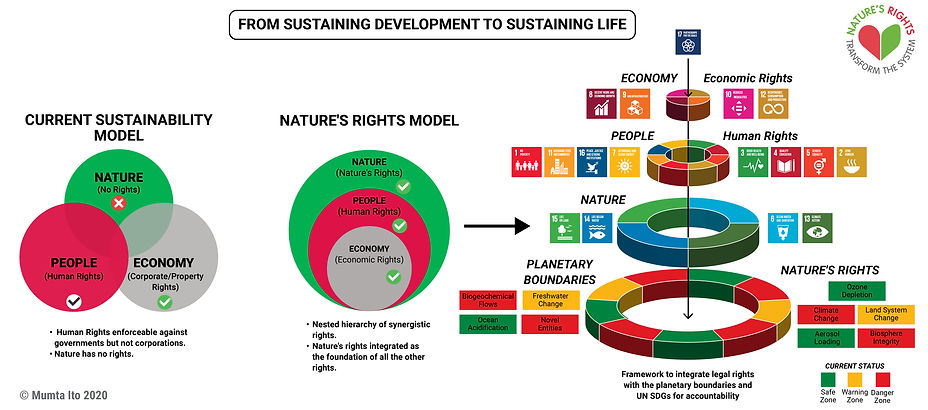
Why This Framework
Law and policy frameworks based on outdated paradigms that separate us from the rest of Nature have led to societal systems that are destroying the foundations of life. Economies based on infinite growth, agriculture that poisons the earth, and energy that depletes the source are unsustainable on a living planet.
Our Strategic Legal Approach
From Degeneration to Regeneration
The Degenerative Cycle
Our global challenges are rooted in outdated laws driving our societal systems towards dangerous paths. But what if we changed this? What if we could reprogram our systems from decline to renewal? Watch the Framework Walkthrough video and download the Framework Guide below for access to diagrams. ‘Understand how legal structures separating us from the rest of nature have led to a cycle of degeneration – and is now threatening our collective future.


The Regenerative Cycle
By recognising our interconnectedness with Nature, we create a holistic framework where human and corporate rights align with Nature's rights. Embracing Nature's rights as the foundation for all other rights puts Nature at the center of our legal system, which is essential for our survival and prosperity. Watch the Framework Walkthrough video and download the Framework Guide below to access diagrams and understand how this approach sparks a cultural shift in values, redirecting investment towards a regenerative future.
From Rights to Right Relationship
In essence, the Integrated Rights Framework can be seen as a modern, legal articulation of the ancient Indigenous principle of "right relationship," formalising these timeless values into a framework that contemporary societies can adopt and enforce.
Healing Our Relationship With Nature
Our current sustainability model assumes that Nature, people and economy are separate, ignoring the fact that people and economy are sub-systems of Nature. Moreover, sustainability is no longer enough; we must embrace regeneration before we reach irreversible tipping points. The Integrated Rights Framework establishes new legal norms that can change society's mindset, rules, and goals, leading to a thriving future for all life on Earth. Find out how by exploring our framework.

THE INTEGRATED RIGHTS FRAMEWORK
Creating the Legal Foundations for A Regenerative Society
The Integrated Rights Framework, developed by Mumta Ito, is backed by a research study we conducted with the Universities of Bologna, Sienna, and Salento for the European Economic and Social Committee - Towards a Fundamental EU Charter for the Rights of Nature. Rooted in globally recognised scientific indicators and targets, this framework represents a practical solution for implementing Nature’s rights across all levels of governance, from local to global.

© Mumta Ito 2020. All rights reserved.
The Framework Walkthrough Video
The Framework uses law as a catalyst for societal transformation, recognising Nature's rights as fundamental to human life and economic prosperity. Integrating the rights of humans and the economy within the rights of Nature - in alignment with planetary boundaries and the UN Sustainable Development Goals - can significantly enhance long-term economic viability, paving the way for a regenerative well-being economy. This approach emphasises the interdependence of ecological health, human well-being, and economic stability.
How The Framework Benefits Society
The Integrated Rights Framework transforms governance by prioritising Nature's rights as fundamental to human and economic rights. It promotes holistic decision-making and nurtures transparency, accountability, and stewardship for a regenerative future.
Endorse The Framework
By supporting this framework, you advocate for comprehensive environmental protection, proactive measures to prevent ecological harm, and a holistic understanding of the interconnectedness between human rights, ecological health, and socioeconomic well-being. Together, let's foster cultural respect and ethical harmony with Nature and establish clear legal frameworks that ensure environmental accountability. Join us today to shape a sustainable future where all life thrives.

What legacy will you leave?
It makes no sense to destroy life's foundations for profit, only to fund disaster recovery later. Regenerative economies and cultures aren't just possible—they're necessary for a thriving future. Together, we can avert self-destruction and build a prosperous, regenerative society - if we act now. Unleash your power to shape our future consciously today!























.png)
.png)
.png)
.png)
